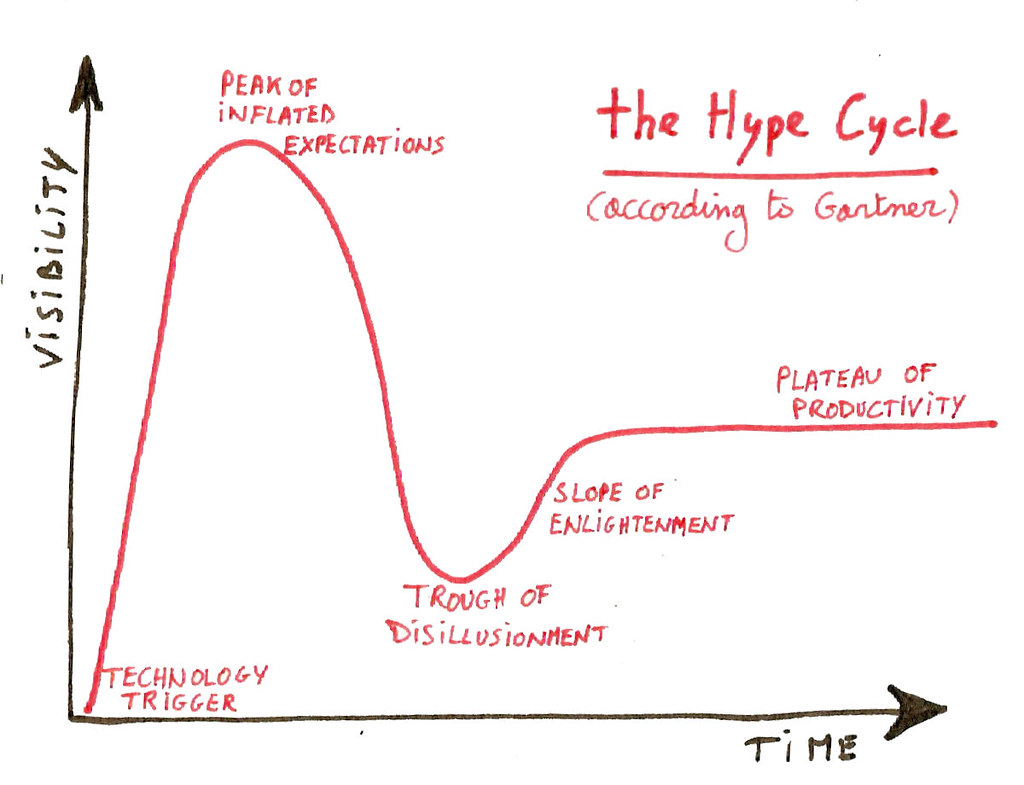By Alex Challans (CEO) and Matt Swayne (Editorial Director) of The Quantum Insider.
Quantum technology, devices that rely on quantum mechanics for computation, sensing and a range of other applications, may have achieved hype status faster than any other previous technological wave. The glittering quantum computer chandelier adorning the Jan. 26 Time Magazine cover story on quantum might be a trophy of the technology’s record-setting hype status.
The oft-cited, yet poorly defined hype cycle has become integral to media conversations surrounding the introduction of new technologies. These discussions, once civil and productive, are now more likely to rise to the level of ad hominem attacks that are counterproductive to the long-term success of what could be an important tool for everything from non-satellite navigation to personalized medicine. National security also hangs in the balance.
First, let’s try to de-hype the hype cycle itself. The hype cycle is most famously exemplified by the Gartner Hype Cycle, however, recently the tag has been decoupled from that methodology to refer to any wave of interest in a technology. In truth, though, this cycle of rising and waning excitement can better be explained as a typical wave of human interest and focus. In the short term, we can see the phenomena play out in news cycles, for example. News stories – from celebrity deaths to future quantum hacking – follow a typical pattern that rapidly peaks in interest, often drowning out other – more important – issues. Eventually, those stories, which once riveted the general audience, begin to wane, settling into not a trough not of disillusionment, but of fickle disinterest. Longer term, we see similar patterns in everything from protest movements to musical fads.
Both the inflated expectations and — importantly — the depths of disillusionment have little to do with the intrinsic value of the technology itself, or its future potential. Exposing the hype cycle to be simply normal human information processing may seem to be merely one of semantics, but the hype moniker is problematic for a few reasons, particularly in the science and technology field.

Hype, Cynicism and National Security
First, there is an intentionality in the term, hype. In other words, a technology must be hyped by someone. Hype is also conspiratorial. Usually it’s not just someone who is hyping an emerging technology — for example, a quantum computer — but a nefarious unseen cabal of “someones” actively hyping the technology out of self-interest.
Therein lies the potential for long-term damage to quantum efforts. Just as this is a hype cycle, it can swiftly turn into a cynicism cycle. A cabal of hypers who point out every success and gloss over technical challenges ahead will likely inspire a cabal of de-hypers who make an effort to decry the technical challenges as impossible and attempt to quash real advances and well-intentioned hope for success.
Because human interest and focus is nearly as vulnerable as those superconducting qubits resting isolated in the golden chandelier, hype eventually fades, quite possibly leaving not disillusionment, but a deep distrust and cynicism in quantum technology. What must be emphasized is that tomorrow’s wallowing quantum cynicism is no more supported in facts than the mad peak of quantum hype we are allegedly experiencing today.
The danger is a quantum winter settles in, funding dries up, investments meander into other fields and research areas, until ultimately, quantum is reduced to a ground state.
Good, the quantum cynics may cry, attributing the demise to the natural consequences of the quantum hype machine. But this hype-cynicism wave is different for quantum. There is simply too much riding on the success of quantum technology to allow it to fade away and spend a decade or two in a trough of research disillusionment before gradually regaining traction. Quantum technology holds in its grasp key elements of national security, such as the ability to shred current data security protocols and achieve precise navigation for military vehicles even when satellites are jammed.
On the other hand, autocratic regimes are not swayed by public opinion, Twitter flaming or LinkedIn shaming. They can afford to invest in research in steady or increasing amounts. The geopolitical balance literally could be held by the thread of the findings in a single study or the revelation of an obscure experiment.
That’s what’s at stake. So what do we do?
How We Can Break The Tech-Hype-Cynicism Cycle
We humans are typically not good at predicting what technologies will work. Thomas Watson, president of IBM famously contested that “I think there is a world market for maybe five computers” in 1943. Often blinded by cognitive biases, academic grudges and ideological differences, past technological hypers and haters alike have demonstrated the difficulty of accurately predicting the achievement – let alone the timeline and impact – of emerging technologies. Consider Albert Einstein, who some call the father of nuclear energy, initially didn’t believe nuclear power was even possible, adding, “There is not the slightest indication that nuclear energy will ever be attainable. It would mean the atom would have to be shattered at will.” In computing, that crystal ball is even easier to shatter. In 1998, Paul Krugman, renowned economist, said, “The internet will fade away because most people have nothing to say to each other. By 2005 it will be clear that the internet’s impact on the global economy has been no greater than the fax machine.”
We propose there are several ways of breaking the Tech-Hype-Cynicism cycle.
Most importantly, we need better data. Between 2019 and 2022 we estimate that 30 new quantum computing hardware companies were founded, each pursuing slightly different aims and technologies. Before we start calling out dead-ends we need to have a holistic understanding of the myriad paths being pursued. In markets where intellectual property is jealously protected and national security interests abound, we must make use of the best open source intelligence available. At Resonance we believe that insights into the state of the market can be found in the relationships and partnerships being built between organizations. We may not be able to understand every business, but we can extract insights from hotspots of research and collaboration.
Secondly we need smarter science communication strategies and more realistic expectation setting.
Better data should ease confusion about what might be the most complex technology ever created. But, the latest science communication research also suggests that we need to discuss the latest findings on quantum research in clear and convincing ways. Messages based on greed and fear and driven by divisive social media posturing will only cause deeper fissures between people who are actually on the same team.
Thirdly, we need to work together. Quantum critics and quantum promoters can form unstoppable teams that balance realism with optimism to build quantum technology that works for all and quantum technology that works for good.
Within a few short years, quantum technology has gone from science fiction to popular science. Its fast ascent has intensified the hype-cynicism cycle for this technology. Without a deeper understanding of the space and proper and realistic communication about its potential, quantum computing could join a list of scientific issues – from vaccinations to climate change – that are clouded and crippled by irrational exuberance and irresponsible cynicism.
Maybe we can’t create an eternal quantum spring, but perhaps we can make sure quantum winter is short and mild.
For more market insights, check out our latest quantum computing news here.




















